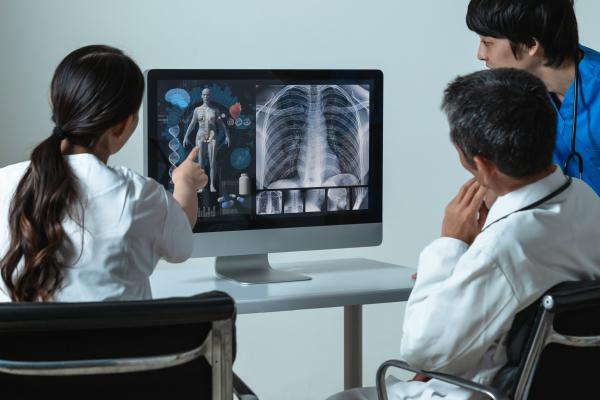1 TRILLION US$ IMPROVEMENT POTENTIAL IN HEALTHCARE INDUSTRY
GenAI is a game-changing technology that has enormous potential to revolutionize the healthcare industry. Recent McKinsey studies reveal that GenAI represents a meaningful tool that can help unlock $1 trillion of improvement potential present in the healthcare industry.
GenAI technology relies on deep-learning algorithms to create new content such as text, audio, code, and more. It can take unstructured data sets - information that has not been organized according to a preset model - and analyze them. Generative AI models learn the patterns and structure of their input training data and then can generate new results.
The ability to analyze unstructured data is representing a potential breakthrough for healthcare operations, which are rich in unstructured data such as clinical notes, diagnostic images, medical charts, and recordings.
Numerous use cases for AI are emerging. Hospitals, physician groups as well as health insurances are starting to explore the potential. The following chart shows an overview on use cases currently in focus.
HEALTHCARE INDUSTRY IN EXPLORATION MODE

Healthcare executives in hospitals as well as health insurances are prioritizing GenAI as key investment area the next years. According to a recent Klas survey 58% of health system executives are ready to incorporate GenAI within the coming year. However, only a quarter have already embraced GenAI tools.
According to different surveys, healthcare organizations are taking a stepwise exploration approach:
- Healthcare organizations are most likely to start with applying GenAI to administrative and operational use cases, given their relative feasibility and lower risk. The most important use cases will be capturing charge and reconciliations, structuring and analyzing patient data as well as workflow optimization.
- A second area for exploration will be the communication interface to patients / customers. Here GenAI has enormous potential to optimize telehealth and customer service operations.
- Over time, once companies have more experience and confidence in the technology, these organizations may start to use GenAI with clinical applications.
STREAMLINE HEALTHCARE ADMINISTRATION WITH AI
GenAI has the potential to automate administrative tasks, boosting the efficiency and effectiveness of healthcare professionals. Through Artificial Intelligence, hospitals, healthcare institutions and health insurances can streamline operations, optimize workflows, and reduce the burden of routine administrative duties.
The opportunities for GenAI to revolutionize administrative processes in healthcare include supporting prior authorization, facilitating billing and insurance processing, managing electronic health records (EHRs) more efficiently, and even enhancing inventory management. Let’s explore some of these examples.
Top challenge for hospitals as well as for health insurances is document processing. The healthcare sector is filled with numerous documents that need to be captured, processed, and archived correctly. Documents are including various unstructured and semistructured data sources, like medical images, medical notes, treatments, patient documentation, reports, etc.
With Intelligent Document Processing (IDP) techniques, using AI and natural language processing, companies can extract and interpretate relevant unstructured information from different sources, and then process it. This becomes very helpful for companies, as it can reduce time and manual efforts in areas like billing, claims processing or in managing Electronic Health Records (EHR). According to recent IDC study by 2026 enterprises will see a 20% increase in new use cases leveraging upon AI enhanced Intelligent Document Processing.

AI enhanced medical coding and billing has a huge potential to optimize processes in hospitals. Through natural language processing (NLP) and machine learning algorithms, AI can analyze medical records and assign appropriate billing codes automatically. AI supported data entry can streamline the process of inputting patient information, insurance details, and other relevant data into billing software. On top AI systems can also secure compliance and detect potential fraud based upon continuous analysis of billing data.
On the insurance side AI enhanced claims management is the top priority. Healthcare claims processing often involves cumbersome manual procedures, from the submission to review and approval. The administrative burden can be significant, and the complexity of processing rules is enormous. AI, as a core technology for automation, can handle the data entry, verification, and routine administrative processes with unparalleled speed and accuracy.
Additionally, AI can be trained based on historical data to identify anomalies and potential fraud in real time. Natural Language Processing also enables systems to comprehend and interpret unstructured data from clinical notes, and other documents.
This capability streamlines the extraction of relevant information for claims approval.
CASE STUDY: CLAIMS PROCESSING FOR SWISS HEALTH INSURERS
In Swiss health insurance industry, the hybrid input process, i.e., the processing of physical and digital documents, is usually highly fragmented, an automated end-to-end process often does not exist, and the technical system landscape is very complex to maintain.
SPS – a leading technology driven business transformation company – provides business process solutions for health companies. The service specializes in receiving physical (letter, fax) and digital incoming mail (SMS, email, web portal, app, EDI) across all communication channels. The solution sorts, classifies and captures documents such as cost statements and healthcare provider invoices and makes the data available directly in the insurance system. SPS is a frontrunner in applying AI to further increase automation and efficiency.
A specific case example is SANITAS, a Swiss health insurance with 850’000 policy holders processing 3.3 M documents per year.
Another typical administrative challenge is Prior Authorization (PA) - a management process used by health insurance companies to determine if they will cover a prescribed procedure, service, or medication. Many doctors say that they spend many hours each week just dealing with these authorization issues. This process involves a lot of back-and-forth decisions to figure out if medical care is necessary and to prevent fraud. An AI based triage engine could help to optimize this process. The triage engine filters low complexity cases that are suitable for automatic decision making. It supports decision making in medium complexity cases by providing important context information from electronic health records and previous claims, High complexity cases are filtered for manual review by expert doctors.
FREE TIME FOR MEDICAL STAFF TO FOCUS ON PATIENTS
One main intention of AI driven applications is to reduce administrative burden with the medical staff. AI-powered virtual assistants can handle inquiries and administrative tasks, freeing up precious time for medical staff to focus on delivering quality care to patients.
The allure of GenAI lies in its capacity to autonomously create new content, providing relief from tedious tasks like note-taking and data entry, which have historically afflicted healthcare professionals. The following case study illustrates the potential.
CASE STUDY: HCA HEALTHCARE WITH GOOGLE

HCA Healthcare, a prominent healthcare provider, is utilizing Google Cloud's GenAI technology to enhance its operations. In a pilot program initiated in 2023, approximately 75 emergency room physicians across four HCA Healthcare hospitals are leveraging Google's AI technology to streamline clinical documentation processes.
Through natural language processing and Google Cloud's generative AI capabilities, the program automatically generates medical notes from clinician-patient conversations. These notes are then reviewed and finalized by physicians before seamlessly transferred to the hospital's electronic health record system. Initial feedback from physicians in the pilot program indicates strong overall satisfaction, highlighting the potential impact of this innovative solution.
Additionally, HCA Healthcare is exploring the integration of GenAI to optimize patient handoffs between nurses, aiming to standardize and automate this critical process while promoting continuity, consistency, and patient safety.
ENHANCE PATIENT / CUSTOMER EXPERIENCE WITH GENAI
GenAI has taken an incredible step forward in improving communication between healthcare providers and patients. AI-powered communication tools, such as chatbots and virtual assistants, stand at the forefront of this transformation, offering tailored and timely support to individuals seeking medical information and assistance. These intelligent systems have the capacity to engage with patients, providing accurate and relevant healthcare advice, guidance, and support round-the-clock. This is a key accelerator for telemedical services.
GenAI is mature enough to provide relevant answers to health questions and support patient communication. A study published last year in the journal JAMA Internal Medicine showed how a selected panel of healthcare professionals preferred ChatGPT's responses to medical questions 79% of the time over those from doctors. This outcome highlights how AI can even assist healthcare professionals in communicating with patients.
GenAI also opens a great opportunity to create customer-friendly processes in medical institutions. Picture an AI-driven scheduling system seamlessly orchestrating patient appointments, optimizing clinic flow, and reducing wait times. Such systems, fueled by machine learning algorithms, forecast demand, adapt schedules in real-time, and even engage patients through interactive chatbots, offering convenience and accessibility.
Finally, GenAI will enhance member services provided by the health insurance industry. This can range from superior customer care applications to personalized preventive healthcare programs.
SUPERIOR PATIENT / CUSTOMER COMMUNICATION DRIVEN BY AI
By leveraging machine learning algorithms, GenAI tools can adapt and evolve based on patient interactions, ensuring a personalized experience that meets individual needs and preferences, and offering extra advantages:
24/7 Availability and Efficiency: AI-powered communication tools, such as chatbots and virtual assistants, can be available round-the-clock, providing support and information to patients even outside of traditional office hours.
Consistency and Scalability: AI allows healthcare providers to handle a larger volume of inquiries and interactions simultaneously, without compromising quality of care or response time. It also reduces the risk of human error or inconsistency.
Personalization and Engagement: AI-driven communication tools can tailor responses and recommendations based on individual patient characteristics, preferences, and medical history, providing a more personalized and relevant experience. Furthermore, these tools engage patients proactively, providing them with reminders, and encouragement to adhere to treatment plans and preventive care measures.
Cost-effectiveness: By automating tasks and streamlining processes, AI can help healthcare providers optimize resource allocation and reduce operational costs associated with communication and administrative tasks.
Data-driven Insights: AI can analyze communication data to identify trends, patterns, and patient preferences, enabling healthcare providers to make data-driven decisions and improve the quality of care and patient experience over time.
Enhanced Accessibility: AI-powered communication tools can be integrated into various channels, including websites, mobile apps, and messaging platforms, making healthcare information and support more accessible to patients regardless of their location or device.
Proactive Health Monitoring: AI-powered communication tools can monitor patient communication and symptom reporting in real time, alerting healthcare providers to potential health issues or changes in condition that require immediate attention.
Emergency Response: AI can facilitate rapid emergency response by triaging patient communication and identifying urgent or critical situations, ensuring timely intervention and appropriate escalation to emergency services when necessary.
Feedback Collection: AI can collect and analyze patient feedback and satisfaction surveys, allowing healthcare providers to continuously improve their communication strategies and service delivery based on patient preferences and experiences.
DATA PRIVACY AND ETHICAL CHALLENGES OF GENAI IN HEALTHCARE

Alongside its potential benefits, GenAI also comes with ethical challenges that necessitate careful consideration.
One of the primary concerns surrounding GenAI in healthcare is data privacy. Patient healthcare information is highly sensitive, and ensuring its protection is paramount. With GenAI processing vast amounts of patient data, there's an increased risk of breaches and unauthorized access. Therefore, security safeguards are crucial to protect healthcare data.
Compliance monitoring: There are strict legal obligations for patient data protection that need to be fulfilled anytime. Information systems and data must be audited and continuously monitored to determine if any data compromises are occurring.
De-identification for analysis: An avenue to leverage health data in AI systems is the de-identification. This means that anonymized data can be analyzed to create general learnings.
Access controls: It is essential to understand who will have access to the data and algorithms and ensure strict controls appropriate to the level of access are provided.
Training: Personnel and vendors must be educated on their access limitations, limitations on data use, and security obligations with regards to the data. In particular, this should include any limitations found in patient consents or authorizations.
Moreover, the use of unstructured data sets, combined with deep-learning algorithms, raises concerns about the potential for bias in decision-making processes.
If the training data disproportionately represents certain demographics, it could result in biased outcomes, leading to inaccurate or inequitable treatment recommendations. Additionally, the frequent occurrence of incorrect responses generated by GenAI underscores the importance of maintaining a "human in the loop" approach, where healthcare practitioners oversee and verify the suggestions made by the AI to ensure patient safety and well-being.
To realize the full potential of GenAI while mitigating ethical risks, healthcare executives must prioritize data security, address bias and fairness concerns, and establish robust risk and legal frameworks. Moreover, investing in people and partnerships will be essential to ensure that GenAI augments rather than replaces human expertise, and that healthcare professionals are adequately equipped to utilize and oversee AI-powered systems effectively. Ultimately, the responsible and safe integration of GenAI into healthcare practices is crucial for achieving the industry's long-term goals of improving patient care and outcomes.
THE TIME TO SHAPE AI ENABLED HEALTHCARE IS NOW
The healthcare industry has already started the adoption of AI. Realizing the full potential of AI in healthcare will require continuous effort from all stakeholders in the next years. It will require to take decisive action, by embracing innovation, investing in technology infrastructure, and prioritizing patient-centric approaches.
It is essential to explore the transformative applications of AI, leveraging its capabilities to drive positive change, mitigate the data privacy and ethical risks, and ultimately, enhance the quality of care for all.
RELATED ARTICLES

How can generative AI can transform productivity?
The personal computer (PC) was invented in the 1980’s. However, it was not until the late 1990’s, when unit costs had dropped and PCs started being connected to the internet, that this breakthrough started having a noticeable impact on productivity figures.

The Impact of Gen AI on the Insurance Industry
The insurance industry is undergoing a profound transformation as it embraces cutting-edge technologies such as artificial intelligence (AI), deep learning, and connected devices. This transformation relies on the following key technological trends.

Use-cases for generative AI
As explored in the first post in this series, generative artificial intelligence (AI) is a ground-breaking technology that uses large language models (LLM) to create...